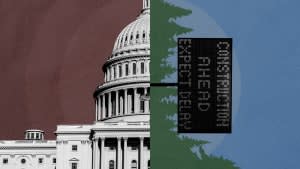The disappointing GDP report is a wake-up call for Democrats

The American economy was red-hot in the second quarter of 2021, growing at a 6.5 percent annualized rate, adjusted for inflation, and surpassing its pre-pandemic level. Good news, but there was a problem: Many on Wall Street expected a white-hot economy of 8 percent growth or higher. What's more, that expectation comes after it had been drifting lower of late. So real GDP growth failed to hit even that reduced target.
It's a disappointment Washington should take note of, especially the Biden White House and congressional Democrats as they attempt to push through two big spending bills. If the government injects money into an economy at a level that exceeds its capacity to productively meet that increased demand, the result will be higher inflation rather than more real growth. And it's growth after inflation that translates into higher take-home pay for workers.
But rising prices are eating into those gains. Not counting inflation, the economy grew at a 13 percent pace, the fastest non-pandemic quarter of growth since the third quarter of 1981. But inflation offset nearly half of that increase. It's one sign that too much money may be chasing too few goods. Or as consulting firm Capital Economics characterized the GDP report in a morning research note, "Overall, more evidence that stimulus provided surprisingly little bang-for-its-buck, with the economy quickly pushing up against unexpected supply constraints instead, which has driven inflation higher."
And while some of these supply constraints are temporary, the concern among economists is that if prices rise for a sustained period — whatever the nature of the initial causes — the surge will change our expectations about future inflation. And those altered expectations can become self-fulfilling if workers start demanding higher pay and businesses start charging higher prices as a result of those beliefs.
With the size of the economy now beyond where it was before the COVID-19 outbreak, policymakers need to think about how their actions will affect both growth and inflation going forward. From that perspective, then, the progress being made on the $1 trillion bipartisan infrastructure bill is encouraging. Of that amount, some $550 billion would be new spending, so far including $110 billion for roads, bridges, and major projects; $66 billion for passenger and freight rail; $39 billion for public transit; $65 billion for broadband; and $17 billion for ports and waterways.
It's a lot of money, even spread over a decade, but the goal is to boost the economy's long-term productivity by improving both physical and digital connectivity. Better infrastructure makes it easier for both atoms and bits to get from here to there. And by boosting the productive or "supply-side" of the economy, sustained inflation is less likely to become a chronic issue.
The other bill Congress is working on could prove more problematic. Anything close to the $3.5 trillion social spending plan (including education, child care, climate change, paid family and medical leave) risks intensifying today's inflationary pressures by pushing even more money into a supply-constrained economy. That's why if moderate Democrats are successful in reducing that amount, it might help make this recovery a longer one. The last thing we need is an inflation shock that forces the Federal Reserve to crank up interest rates and possibly terminate the expansion. Whatever good Democrats think their social spending will do, much could be undone by a recession and rising unemployment. While the pre-pandemic expansion was historically slow, it was lengthy. And by the end, wages were rising across the spectrum, even for the lower-skilled.
Yet if America is going to have a New Roaring '20s of sustained rapid growth, much of the heavy lifting is going to come from the private sector. And there's been lots of good news on that front, even in just the past two weeks. Hey, mock uber-billionaire Jeff Bezos and his provocatively-shaped rocket if you must, but the billionaire "space race" is helping advance technologies that will be critical to creating a multi-trillion-dollar economy in space. The recent announcement by Google-owned AI company DeepMind that its AlphaFold algorithm can confidently predict protein structures could result in new drugs or climate-resistant crops. Then there's the Wall Street report that startup Form Energy may have found the "holy grail" of the renewable energy sector: an inexpensive battery that provides long-lasting power storage for grids.
To get the most out of those and other innovations, America needs an efficient infrastructure system, but also a stable macroeconomic environment. Unfortunately, Washington is focusing too much right now on the former rather than the latter. Maybe this disappointing GDP report will help shift that perspective.
You may also like
CNN airs incredibly explicit and threatening voicemail D.C. officer received during Jan. 6 testimony
Why Tom Brady's 'gentle' roast of Trump at Biden's White House was actually 'deeply vicious'
Democratic congressman makes 6 Fergie puns in 1 minute on House floor

 Yahoo Movies
Yahoo Movies 